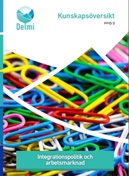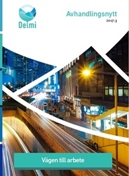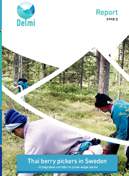This anthology sheds light on questions such as why labor immigrants come to Sweden in particular and under what conditions they work, how the problems that have arisen can be explained and how they can be solved. The book is not just about the conditions for the citizens of countries outside the EU who come to Sweden for the purpose of working. It also addresses the conditions for those who change tracks from asylum seekers to labor migrants, as track changes were part of the 2008 reform. In addition, the current legislation for irregular or undocumented workers is problematized to illustrate the conditions for those who do not meet the requirements of the Aliens Act for work in Sweden.
Some overall conclusions and recommendations
- Labor immigration has been at a slightly higher level since 2008 and it has increased clearly in certain occupations with low qualification requirements where it was previously not possible to obtain a work permit due to the labor market test.
- There are mainly three different categories of labor immigrants who have come to Sweden: 1) berry pickers, 2) computer specialists and 3) those who work with cleaning and in restaurants.
- There is an "international division of labor" among labor immigrants to Sweden: Berry pickers and more come from Thailand, computer specialists from India, special chefs from China and so on. The proportion of cleaners coming from Mongolia and Uzbekistan is very high, at least for some years, as is the proportion of newspaper distributors coming from Pakistan. This also says something about existing international networks and contact routes.
- One proposal that is lifted is that the criminalization of the work of irregular migrants should be abolished. The crime of illegal migrant work strengthens the subordination of the undocumented and makes it easier for employers to put pressure on working and employment conditions. This also increases the demand for paperless labor.
- In summary, the author of the book wants to emphasize the importance of the measures taken being balanced. With the current system, the employer cannot be held liable when the conditions on which the work permit is based have not been applied. It is important to design the regulations in a way that also creates incentives for employers to make well-thought-out choices before deciding to recruit from third countries.
About the report authors
The report, Labor from around the world: What happened to the 2008 reform? (2015: 8), is written by Henrik Emilsson researcher at Malmö University in international migration and ethnic relations, Karin Magnusson, active at Malmö University in migration research, Dominika Borg Jansson, PhD in law at Uppsala University, Niklas Selberg, Senior Lecturer at the Department of Law Faculty at Lund University, Judy Fudge, Kent Law School, University of Kent, UK, Charlotta Hedberg, Department of Geography and Economic History, Umeå University, Eskil Wadensjö, Institute for Social Research, Stockholm University, Olle Frödin, Senior Lecturer at the Department of Sociology , Lund University, Anders Kjellberg, Professor of Sociology at Lund University, and Anders Neergaard, Professor at Linköping University, and Lisa Pelling, Head of Investigation at Arena Idé with special responsibility for democracy and welfare issues.
Editors were Catharina Calleman, professor of labor law at Örebro University and Stockholm University, and Petra Herzfeld Olsson, associate professor of civil law and senior lecturer in international labor law at Uppsala University, Department of Law.
Picture by Danial Igdery from Unsplash.



